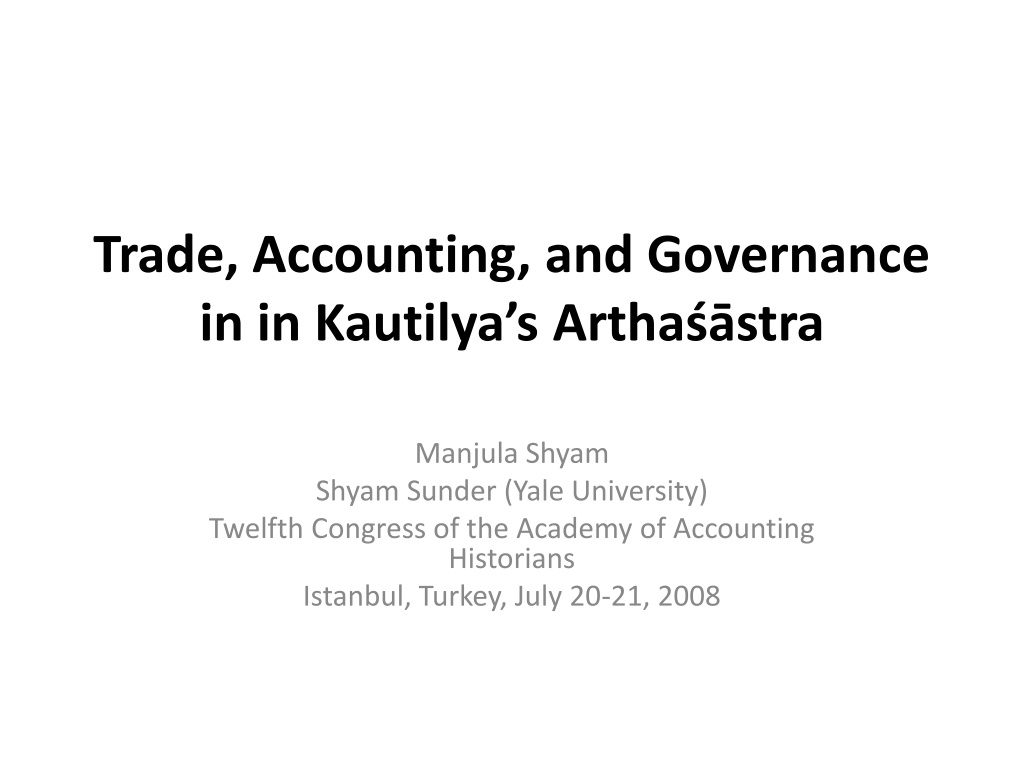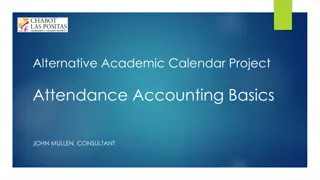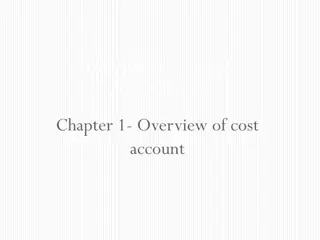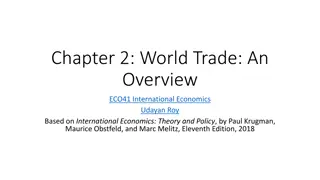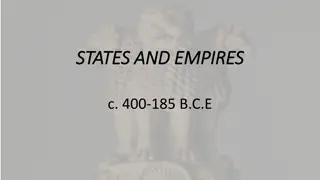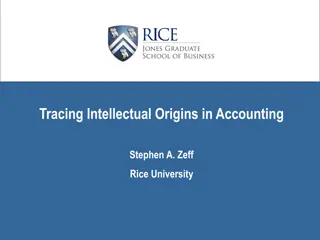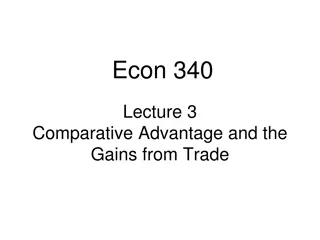Trade, Accounting, and Governance in Kautilya's Arthashastra
Kautilya's Arthashastra, a Sanskrit treatise from the late fourth century BC, discusses the principles of trade, accounting, and governance in ancient India under the Mauryan Empire. It emphasizes the importance of proper administration, wealth management, and the prevention of corruption within the government. The text explores concepts of business, auditing, and economic structures relevant to the society of that time, highlighting the close relationship between material well-being and socio-political organization.
Download Presentation

Please find below an Image/Link to download the presentation.
The content on the website is provided AS IS for your information and personal use only. It may not be sold, licensed, or shared on other websites without obtaining consent from the author. Download presentation by click this link. If you encounter any issues during the download, it is possible that the publisher has removed the file from their server.
E N D
Presentation Transcript
Trade, Accounting, and Governance in in Kautilya s Artha stra Manjula Shyam Shyam Sunder (Yale University) Twelfth Congress of the Academy of Accounting Historians Istanbul, Turkey, July 20-21, 2008
Arthastra A late fourth century BC Sanskrit treatise on material welfare, administration and political strategy Its author Kautilya was the advisor and mentor of emperor Chandragupta Maurya (321-297 BC) Chandragupta established a large empire with its capital in Magadha, covering almost all of India 10/3/2024 Accounting in Kautilya 2
Mauryan Empire 10/3/2024 Accounting in Kautilya 3
Just as it is difficult to know if a swimming fish is drinking water, it is difficult to detect if officers appointed for carrying out works steal king s wealth Artha stra(2.9.33)
Arthastra Three chapters of Book 2, (Chapter 6, 7, and 8): define, and use important concepts of business, accounting, and auditing Basu and Waymire (2006): Evidence from Mesopotamia on co-evolution of accounting with human brain, language and law Co-evolution theory: material well-being and socio-political structures of a society should correlate with the necessary accounting, business and economic concepts Main Sources: English translations of Kangle (1960) and Rangarajan (1992), and interpretive essays by Kangle (1965), Choudhury (1982), Bhattacharya (1989), and Mattessich (1992) 10/3/2024 Accounting in Kautilya 5
Mauryan Economy Magadha was a center of trade and commerce with its fertile soil and rich mineral deposits Kautilya organized a centralized hierarchical government to promote agriculture, manufacture, mining, tax collection, trade, communication, build market places, and to maintain statistics Division of the realm into provinces, districts and villages governed by centrally-appointed officials Traditional tribal lands paid taxes, newly cleared lands were leased to cultivators for their lifetime Pastures, forests and mines owned by state that also built water tanks, roads and canals Shreni (craftsmen guilds) in cities 10/3/2024 Accounting in Kautilya 6
Mauryan State Kautilya conceptualized economic wealth as the cornerstone of a successful state Good intentions and virtue of a noble king are insufficient to preserve, sustain or enhance the state or to improve the lives and livelihoods of the people Material well-being dominates because the spiritual good and sensual pleasures depend on it It is the responsibility of the ruler to safeguard and increase the size of the treasury Ensuring that treasury resources are adequate, safe and available requires clear exposition of concepts and principles of accounting and control 10/3/2024 Accounting in Kautilya 7
A Practical Treatise Artha stranot a theory about the source of ruler s authority Focuses on obligations of the ruler to the ruled Deliver stability and order so commerce, trade and industry can flourish ; protect population from anti-social elements and natural disasters ; ensure their welfare, well-being, and material prosperity Sufficient and reliable treasury is crucial for kingdom s success Hence the need for planning and budgeting, accounting principles and rules, integrity of civil servants reinforced by penalties and incentives 10/3/2024 Accounting in Kautilya 8
Centrality of Wealth Focus on treasury, but not at the expense of justice, or higher moral principles Ruler must acquire wealth, secure the acquisitions, increase what has been secured, and use the profits for deserving objectives Assess and collect taxes justly; unjust actions cause revolt Impoverished people become greedy; greedy become disaffected; disaffected either go over to the enemy or themselves kill their master Artha stra consider sadequacy of resources as the key to success: money begets money (need elephants to catch wild elephants); provides a means to coast over calamities; even the best of efforts do not succeed without money Investment of capital is required to increase productivity and generate resources for growth and prosperity of the realm 10/3/2024 Accounting in Kautilya 9
Calamities Calamities of divine (bad luck) and human (wrong policy) origin Finances needed to cope with such adversities because a wise king should not collect revenues in times of distress Tax exempt a region laid waste by the army of an enemy, or afflicted by disease or famine The genius of Kautilya lay in recognizing the centrality of material well being for human welfare, and then pursuing it to its logical conclusions Artha stra stands in stark contrast to frequent characterizations of Indian philosophy as being predominantly spiritual, not material 10/3/2024 Accounting in Kautilya 10
Trade and Commerce Agriculture, cattle rearing, forests, mines, factories , trade generate resources Director of the Marketplace (like US Federal Trade Commission and Consumer Protection Agency) to Protect the consumers from irresponsible traders Inspect weights and measures Prevent stolen goods from being sold as second hand goods Sample goods to ensure quality and mislabeling Prevent sales of adulterated foods and medicines Prevent collusion among traders to raise prices through artificial scarcity Ensures that the goods are sold at the fixed prices and the profit margin of the merchants does not exceed 5 percent of the full cost (price level or margin maintenance is unclear) Balance the interests of the traders by providing exemptions and assistance when the goods are damaged by unforeseeable circumstances 10/3/2024 Accounting in Kautilya 11
Custom Duty Schedule of duty on incoming goods by various categories (e.g., 20 percent for goods, 17 percent for agricultural products) No sale of commodities allowed at the place of their origin (e.g., at mines, fields, or fruit orchards) to control of prices and collect duties The Director of Trade fixes the price of indigenous goods to permit 5 percent profit over their full cost (including purchase price, investment of capital, interest charges, duty paid, transportation, etc., and selling costs A profit of 10 percent permitted on sale of imported goods Stockpiling to raise the price above the level fixed by the state iprohibited; heavy penalties for exceeding the fixed price In a market glut, Director of Trade purchases the entire stock and sells at one place, and private merchants would not be permitted to sell the good to ensure a fair price to the producers (cf. agricultural price supports) Encourage the import of foreign goods if not available locally 10/3/2024 Accounting in Kautilya 12
State Trading Chief Controller of State Trading manages state trading Trading in state monopoly goods, commodities produced from state owned lands and factories, and commodities received at the Treasury Has expertise on the full cost of producing and bringing to the market, and on current supply-demand of, commodities, so as to fix the prices considering interests of consumers Sell goods and commodities from state lands in one place, to avoid price competition with private traders; organize sale of imported goods at dispersed locations to make them generally available outside the capital city State goods sold by agents in the Trade Department, exceptions for private traders who pay a fee in lieu of the profit lost on direct sale Sell so as to favor the consumers, and avoid profiteering on state sales Promptly collect sales proceeds, ensure proper accounting by sales officers, collect transaction fee (5 percent) on deliveries to the Treasury 10/3/2024 Accounting in Kautilya 13
Foreign Trade Encouragement to foreign trade reflects strength of the Mauryan economy Director of Trade to be conversant with value of commodities, demand for various kinds of goods in various regions, whether they arrived by land or sea, the appropriate timing for purchase or sale of various goods, and whether the sale should be dispersed or concentrated Encourage foreign trade through special tax dispensations to enable foreign traders to make a profit Be impartial in disputes between foreign and native merchants No law suits in money matters should be brought against foreign traders unless they are partners in a native corporation Cf. Efficient and impartial dispute resolution mechanisms of countries who prosper from being leaders in modern world trade Strong advocacy of free trade ; foreign trade is desirable for the supply of goods that may not be available indigenously; suggests prosperity 10/3/2024 Accounting in Kautilya 14
Control of Foreign Trade Calculate the cost of trading by including all costs such as payment of custom duties, port levies, freight charges, escort charges, liabilities of the state in case of loss of vessel or goods, cost for protecting the goods whether traveling by land or sea (insurance?) Trade at a loss under certain circumstances (dumping?) Know the demand for different products, ports abroad and their regulations and restrictions, custom duties, etc. Foreign trade conducted on a rational basis earns profits for the Treasury To evade duties, traders may show lower prices or inferior samples; need vigilant officers and penalties to discourage such behavior 10/3/2024 Accounting in Kautilya 15
Accounting and Control Many of Artha stra s accounting concepts parallel their modern use Budgets for revenues and expenditures prepared periodically (classifications by source and purpose) Accrual accounting (outstanding receivables, payables and deferred revenues) Mattessich interprets 2.6.13-16 as work-in-process and finished goods inventories, fixed and variable costs Factory accounts include the cost of raw materials, wages and salaries, cost of the place of work including additions to the factory Shrinkage of weight or volume of materials during manufacturing is explicitly recognized and accounting for Accounts include non-financial information (the number of workers, quantities in weight and volume; quality of materials and the size of their containers) Distinctions in (details of) accounting for high valued and low valued goods 10/3/2024 Accounting in Kautilya 16
Accounting Separate accidental sources of revenues and expenditures from the rest (e.g., recovery of dues and debts that had been written off earlier, compensation collected for loss or damage; intestate property ; for expenditures, unspent budgeted amounts due to disbanding of the army, etc.) Collecting more than what is due can be just as damaging as collecting less; wise administrator fixes the revenues, and tries to control of expenditures (cf. modern debates on taxation and spending) Separate accounting and executive in location and hierarchy If you can t punish or fire one, don t put them in charge of important projects and sources of revenue (dispensability, nepotism) Failure of a contractor to deliver to the results to state: business associates, his guarantors, beneficiaries, sons, brothers, wives, daughters, even servants, are liable in that order 10/3/2024 Accounting in Kautilya 17
Accounting Calendar. Lunar calendar with solar adjustment; 354 days beginning the full moon of Asadha divided into three seasons of rain, winter and summer; third and seventh fortnight of each season have 14 days; an intercalary month added every third year and accounted for separately Materiality: tolerate minor offenses, even if they cause loss Inflation Accounting. Mattessich (1992) : profit arising from increase in price of merchandise at the time of sale manifest an awareness of general or specific price changes and refer to potential profits accruing from those changes: fictitious holding gains (pp.137-138) Duty Evasion. Since state controls prices/margins, this gain does not accrue to the trader. If the price of imported goods rises above the set levels due to buyer competition, the difference goes to the treasury (also defends the treasury against duty evasion by under- invoicing) 10/3/2024 Accounting in Kautilya 18
Good Financial Reports Accounting reports should : Have systematic and logical arrangement of subject matter by priority and importance, Contain the relevant facts, be consistent and not contradictory, Be complete in words and letters without being redundant, describe subject matter with citation of reasons, examples Be pleasing and exquisite in style, Not use colloquial or vulgar language (formal language), Be lucid and understandable. Compare these qualities of good financial reports to those proposed by the Financial Accounting Standards Board and the International Accounting Standards Board (2008, Chapter 2) in their joint project on conceptual framework: relevance, faithful representation, comparability, verifiability, timeliness, understandability, materiality and cost 10/3/2024 Accounting in Kautilya 19
Audit and Review Centrality of treasury to the kingdom makes it the first concern of the king Treasury depleted by theft, natural disasters, tax exemptions, cash gifts, obstruction, lending, concealment, unauthorized use, substitution and misappropriation Establish processes to safeguard the treasury through audit and review The records-cum-audit office to maintains records for each department s Activity and revenue; Details on all factors of production, expenditures of state factories; Specification and standards for measuring instruments for various goods; Laws, transactions, customs and regulations in force in different regions, villages, economic sectors, and corporations; Salaries and benefits of government officers; Receipts in cash and kind by the king and other members of the royal family; Gifts and payments made to, and received from, foreign rulers by the king 10/3/2024 Accounting in Kautilya 20
Head of Records-cum-Audit Informs the work officers about dates accounts and balances are due for audit Ensures the integrity of the records and information provided by the work officers Prevent collusion between the two sets of work officers: accounts brought in sealed containers and must not converse with one another Check receipts for the time, place, amount, source, name of recorder, recipient Check expense entries for time, place, amount, category, person who orders, person who delivers, recipient Check balance entries for place, time, amount, category, characteristics in case of goods etc. Discrepancies in the information due to misrepresentations, errors, negligence or fraud are investigated and punished (an elaborate scale of fines and penalties if the accounts are not duly presented at the predetermined calendar dates, if there is a discrepancy in the accounts due to an inflation of expenses, or for writing the accounts improperly, not in the right place or right order, or for false statements, or for concealment, etc.) According to Kangle, the auditors are independent of the minister and is responsible for planning the budget and revenues and the expenses. 10/3/2024 Accounting in Kautilya 21
Need More than Rules and Standards Artha stra sets out a framework based on clear definition of accounting concepts, and uniform standards But framework alone is insufficient to prevent wrongdoing; need responsible officers above favoritism or vindictiveness to create faith in the system, strong morals and integrity in addition to expert knowledge of rules and conventions The officers selected for knowledge (about the specific conventions, customary norms, and rules governing various activities in the realm), and personal qualities (integrity, energy, stamina, non-addiction to sensual pleasures, courage, fearlessness from the clamoring and outcries of powerful nobles and threats of revolts, ability to separate personal from official, not inclined to favor their family or sycophants, not driven by anger or vengeance, arrogance, of power of the royal connections) 10/3/2024 Accounting in Kautilya 22
Intelligence Network Since power corrupts, even selected people must be reviewed constantly Impossible not to taste the honey or poison placed on the tongue: it is not possible for one handling the king s money not to partake of it Multiple officers to maintain balance, no permanent tenure Judicious use of carrot and stick based on the gravity of the offence The ruler needs an intelligence network to watch and ascertain if officials are living beyond their means (stealing from the state) Look for forty forms of dereliction of duty: not executing a project, not getting the results, not delivering its gains to the treasury, lending goods from the treasury for personal gain; trading in state commodities; concealing or misrepresenting the due date for payment of taxes or revenue; reducing the fixed revenue or taxes or causing an increase in state s expenditure; making personal use of the king s goods; substituting king s goods; not delivering or recording the accrued income 10/3/2024 Accounting in Kautilya 23
Whistleblowers Explicit provision for whistleblowers and their protection, guaranteed protection against reprisals by the officers, and rewarded with a part of the amount involved if the matter were proved Kautilya s recommendation : one-twelfth for whistleblowers who are state servants and one-sixth for others (cf. IRS in US provides 15 to 30%) Kautilya s reward for an outsider is greater than for one within the organization, presumably because reporting such discrepancies are part of the overall responsibility of the state servants. Whistleblowers subject to enormous pressure and threats To minimize the possibility of false accusations, harsh penalties for the whistleblower who may withdraw the charges or fail to appear to prove the accusation during the investigation 10/3/2024 Accounting in Kautilya 24
Rules vs. Discretion Kautilya emphatically disagrees with his predecessors by asserting the ultimate dominance of judgment and discretion as a better guide than fixed rules Fine for a guilty civil servant: 4, 8, 10 or 20 time according to his various predecessors. Kautilya disavows fixed rules and suggests that the fine chosen should be appropriate for the guilt of the civil servant Long history of debate between fixed rules and discretion in jurisprudence, economics, management ,and accounting Fixed rules have the advantage of clarity, fairness, and openness, but no set of fixed rules can anticipate all circumstances, often unfair outcomes Reflects current debates on federal sentencing guidelines, monetary policy, corporate financial reporting by social norms or written standards, and the desirability of the true and fair override in financial reporting 10/3/2024 Accounting in Kautilya 25
Governance: The King, His Ministers and Civil Servants Being the key to success of an organization, Kautilya discusses the problems of governance, starting with the king himself In the happiness of the subjects lies the happiness of the king What is dear to him may not be beneficial to the king, but what is beneficial and dear to his subjects also benefits him. Qualities of a king high standards, detailed guidelines how the ruler should manage his time during the day and night (to consult with councilors, to get current information and give instructions to his ministers, get information from intelligence agents, etc.) By his active involvement, king sets an example for advisors and administrators. Utmost importance of the commitment to improve his kingdom (uses the metaphor of a sacrificial religious right for the act of ruling Sets out an activist plan for a dynamic ruler committed to improving the kingdom (secure allegiance of his own people and leaders, reach an understanding with those in enemy territories, and then devote his attention to planning new undertakings) 10/3/2024 Accounting in Kautilya 26
The Ministers All undertakings should be preceded by consultations with the cabinet How to select ministers? Is it better to have a single or multiple advisors on a particular matter? Should the consultations be held in secret or in a free and frank deliberation? Cites the opinions of various learned scholars of these issues before his own pragmatic recommendation: the number consulted should be determined by the nature of the project; General guidelines: desirability of some continuity among the advisors ; Advice of a single councilor insufficient for a difficult and complex issue; two councilors present the risk of a stalemate and a non-decision if they are rivals while complicity between them could lead to bad decisions. Recommends three to four to reduce complicity and rivalry. Larger group is cumbersome. But no ironclad rules; the desirable number of advisors depends on the time, place, and nature of the issue Deliberate with advisors on: Availability of financial, human and material resources for initiating and completing new undertakings; location, time and duration to be apportioned for the undertaking; provisions for failure (its economic, political, financial implications) if the undertaking has to be altered or abandoned; ramifications and follow-up on success (Government, private sector?) 10/3/2024 Accounting in Kautilya 27
Civil Servants Centralized government for efficient and effective administration Directors of thirty five departments, mission statements and guidelines An intelligence network to observe /record the loyalty and honesty of ministers and state officials, sudden riches or suspicious behavior Importance of knowledge, integrity and temperament; expertise and knowledge can be improved more easily than personality flaws Watch for patrimony squanderers, iunable to delay gratification, niggardliness (may amass wealth and send it abroad) Scout and recruit civil servants from far and wide in the kingdom Periodic reviews; even capable officials may over time become lax Set clear goals and lines of responsibility for state enterprises. Create harmonious teams. Infighting and rivalries cause ruin but excessive fraternizing can subvert the administration and cause financial losses. Kautilya certainly cannot be accused of being a one-handed economist. 10/3/2024 Accounting in Kautilya 28
The Middle Ground All three faults in revenue collection--not collecting funds that are due, harsh exploitation, and not managing the expenses should be avoided. Kautilya is cognizant of this difficulty in setting appropriate objectives. He who causes loss of revenue consumes the property of the king. He who procures double the normal revenue, consumes the countryside. He who spends all the revenue without bringing in any profit swallows the labor of workers. Be sure to receive accurate and complete progress report from the different departments of the true nature, the income and expenses both in detail and in the aggregate so as to make better decisions and issue appropriate policy guidelines To prevent misuse of authority, officials should not have permanent tenure, move them around 10/3/2024 Accounting in Kautilya 29
Scientific Spirit Although most of what Kautilya wrote was intended for public administration, a great deal of his analysis and suggestions are directly applicable to private enterprises as well He mentions many character flaws of men, anger, lust, failure to act, and fear among them Interestingly, Kautilya includes the regard for the other world, and fondness for auspicious days and constellations as one of these flaws: The objective slips away from the foolish person who continually consults the stars before deciding what to do. We only wishes that those who rule the land of his birth in modern times could think as rationally and clearly as he did. 10/3/2024 Accounting in Kautilya 30
Thank You! Please send comments to: Manjula.shyam@gmail.com Shyam.sunder@yale.edu www.som.yale.edu/faculty/sunder
